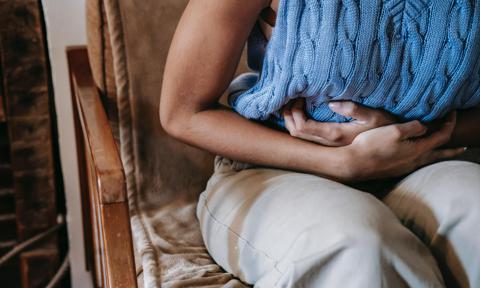
You might be super attuned to the changes in your body when you’re on your periods but one little change in the pattern can throw you for a loop. It also doesn’t help that sexual health education in India is abysmal and we have to ultimately rely on the power of the Internet to search for answers. Turns out there are nearly 45,000 searches around menstrual cycles on Google. We decided to shortlist some of the most popular queries looked up on the platform and get experts to answer them for you.
DISCLAIMER: If you have persistent issues with your periods, it’s best to consult your gynaecologist in person.
Can you sync your cycle with your friends when you spend lots of time with them?
Have you noticed how your close friends are also on their periods the same time as you, especially if you spend a lot of time together? Turns out, that’s not the work of your supposed soulmate bond, but pure coincidence. “There is something termed as the McClintock Effect, or the menstrual synchronization myth, which suggests that pheromones or other factors can influence and shift periods for women who live together by Stemming in a study published in 1971. However, numerous scientific studies have debunked this myth,” says Dr. Bhumika Kotecha Mundhe, Obstetrician and Gynecologist at Masina Hospital, Mumbai.
READ: Are Period Blood Face Masks The Secret To Glowing Skin?
How often should you change your pad?
“Pads and tampons should be changed every six-eight hours,” says Dr. Anagha Chhatrapati, Consultant Gynecologist at Global Hospital, Mumbai, “Blood is an excellent breeding ground for all pathogenic organisms. Beyond six hours, bacterial growth in a blood-soaked sanitary pad or tampon can lead to skin rashes and irritation.” This is not all. Dr. Chattrapati also warns that leaving a tampon beyond eight hours can lead to fatal infections due to toxic shock syndrome. “This is a particularly big risk with super absorbent pads, because girls feel dry all through, and don’t feel the need to change.”

Why is my period always irregular?
While mild irregularity in periods is normal, Dr. Mundhe advises consulting a gynecological evaluation if it becomes too irregular. Dr. Chattrapati agrees and adds, “The most common causes of irregular menses are, stress, physical or mental, and illnesses like viral fever. It’s best to consult your doctor to rule out more serious underlying problems such as endocrine disorders like hypothyroidism or hyperthyroidism and hyperprolactinemia. Another multisystemic metabolic disorder, PCOS (polycystic ovarian syndrome) often leads to less frequent menses, also called oligo or amenorrhoea. Some serious eating disorders like anorexia nervosa and bulimia, renal or liver diseases can also lead to irregular periods.”
Why do you poop so much on your period?
You can blame it on the hormones. The days leading up to your period can make you feel constipated but during your period a hormone called progesterone is released that causes a pattern change in your bowel movements. “(Progesterone) relaxes the muscles of the uterus to facilitate easy passage of menstrual blood. This same hormone also relaxes the smooth muscles of the intestines as well, resulting in passage of poop,” says Dr. Mundhe.
Can I get pregnant on my period?
“No,” says Dr. Chattrapati, “Pregnancy can occur only if the intercourse takes place during the ovulatory period, which is mid cycle, that is between two periods. In a regular 28 days cycle, ovulation occurs on day 14 and the ovum remains alive only for 24 hours. This is the most fertile period of the cycle. Outside of that window, it’s not possible to get pregnant.” However, the doctor warns, with irregular menses and variations between cycles, it can become difficult to predict the exact ovulatory period. “That is why it is advisable to use contraceptive precautions throughout the menstrual cycle.”

Are pads better than menstrual cups and tampons?
“They are all equally effective,” says Dr. Chattrapati, “A woman can choose any of the three, whichever she finds most comfortable.” She adds, “That said, young sexually inactive girls might prefer sanitary pads because insertion of tampon or menstrual cup may be difficult and lead to hymen injuries. On the other hand, sexually active or parous women may find menstrual cup or tampon more comfortable as it doesn’t stain outside.”
Does not getting period cramps mean there’s something wrong?
If you’ve ever been worried about not experiencing any pain or cramps during your periods, unlike your friends and people around you, then rest assured, there’s nothing really wrong with you. “Period cramps are normal. As long as the dysmenorrhea is not affecting the quality of life during those days, it’s acceptable. Generally ovulatory cycles are also painful. But that doesn’t mean if there is no pain, it is abnormal. Both, pain or the absence of pain, are normal,” says Dr. Chattrapati, confirming our theory that some people are just born lucky.

Does heat help with period pain?
There’s a popular belief that taking showers during your periods can cause long-term harm to your body. Turns out, that’s just a myth. Hot showers, and other heat treatments, can actually help you during your periods without causing any harm to your body. “Hot fomentation, the common remedy recommended by mothers and grandmothers, does help in relieving dysmenorrhea,” says Dr. Chattrapati, “Application of a hot water bag on the lower abdomen, taking a hot shower and cleaning the perineum with warm water definitely helps in reducing period pain. It can also be supplemented by mild analgesics like mefenamic acid taken when required.”
What’s the normal amount to bleed during your period?
“The normal amount of bleeding during periods should not exceed 80ml,” says Dr. Chattrapati, “If a woman is using a menstrual cup, she can easily measure the amount. But it’s difficult to assess the amount of bleeding with pads or tampons.” According to her, a normal period should see bleeding which lasts for not more than four to five days, requiring changing three to four pads per day. “Anything in excess of this is abnormal. Also, normal menstrual blood never clots. If there is excessive bleeding, then the anticoagulants are insufficient and there will be passage of clots. So clots in menstrual blood is an indirect sign of excessive bleeding or menorrhagia. In such cases, women are advised to seek medical advice.”






